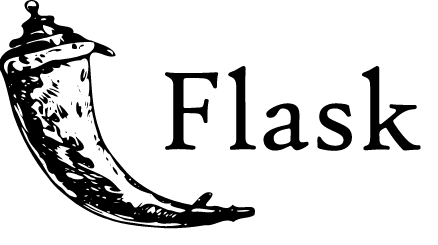「Flask」01: Basic, Route, Templates, GET, POST
前陣子用 Flask 實做了一個 LifePlaylist App 這裡簡單紀錄一下基本的東西,以後回頭更快重拾記憶🤧

< Intro >
"A lightweight Python Web Framework ! " ----> Flask Docs
< Quick start to run a Flask App >
Install:
pip install Flask
Create python file:
touch main.py
Import:
from flask import Flask
Create instance:
app = Flask(__name__)
Route:
@app.route('/')
def index():
return 'Hi Flask App ! '
Setting only when you run python file directly, then execute app.run():
if __name__ == '__main__':
app.run()
Now run Flask App:
python main.py
And Flask Default Port:5000:
http://127.0.0.1:5000will run on local.
Hi Flask App !
< Handling Route >
Example:
|
|
Basic:
@app.route('/login')
def login():
return 'This is login page.'
Handling Multiple routes with same function:
@app.route('/index')
@app.route('/')
def home():
return 'Welcome Home.'
Routing parameters:
@app.route('/<number>')
def number():
return f'Your route is /{number} .'
< Use Template(Jinja2) >
Import:
from flask import render_template
Create xxx.html:
mkdir templates
touch templates/welcome.html
Change return:
@app.route("/welcome")
def home():
return render_template('welcome.html')
Pass parameters:
@app.route("/welcome/<yourname>")
def home(yourname):
return render_template('welcome.html', yourname=yourname)
welcome.html:
Use {{}}
- Basic:
{{ yourname }}
- List:
{{ list.0 }}
- Dict:
{{ Dict.key }}
- If statement:
{% if <xxxx> %}
Hi, {{ xxxx }}!
{% else %}
Oops...
{% endif %}
- For loop:
{% for item in <xxxx> %}
<li>{{ item }}</li>
{% endfor %}
- Use base template:
## Create base.html
{% extends "base.html" %}
- Put own content(child templates):
e.g.: {% block content %}{% endblock %}
e.g.: {% block body %}{% endblock %}
e.g.: {% block custom %}{% endblock %}
< GET, POST >
Import:
from flask import request
Setting route with GET method:
- Settting Route:
Remember is "methods" not "method"
**locals()can pass all args.
from flask import Flask, request, render_template
app = Flask(__name__)
@app.route('/',methods=['GET'])
def index():
q = request.args.get('q')
q2 = request.args.get('q2')
return render_template('get.html', **locals())
if __name__ == '__main__':
app.run()
Remember is "templates" not "template"
- templates/get.html
{{ q }}
{{ q2 }}
- Run local and enter URL
|
|
Setting route with POST method:
- Settting
/formRoute:
from flask import Flask, request, render_template
app = Flask(__name__)
@app.route("/form")
def form():
return render_template('form.html')
if __name__ == '__main__':
app.run()
- Create form.html
Setting
action="{{url_for('submit')}}"for POST route
<!DOCTYPE html>
<html lang="en">
<body>
<form method="POST" action="{{url_for('submit')}}">
<input type="text" name="name" placeholder="Name">
<input type="text" name="email" placeholder="Email">
<button type="submit">Submit</button>
</body>
</html>
- Handle
/submitRoute:
@app.route("/submit", methods=['POST'])
def submit():
name = request.values['name']
email = request.values['email']
return render_template('submit.html',**locals())
- Create submit.html
<!DOCTYPE html>
<html lang="en">
<body>
{{ name }}
{{ email }}
</body>
</html>
- Run local and enter URL
|
|
Handle both GET and POST with one route:
from flask import Flask, request, render_template
from flask import redirect, url_for
@app.route("/form", methods=["POST","GET"])
def form():
if request.method == "POST":
name = request.form['name']
email = request.form['email']
return redirect(url_for('submit',**locals()))
else:
return render_template('form.html')
@app.route("/submit", methods=['POST'])
def submit():
name = request.values['name']
email = request.values['email']
return render_template('submit.html',**locals())
< The End >:
Review:
- Remember Route Method settings is "methods" not "method".
- Remember folder name is "templates" not "template".
- Jinja2 syntax ?
- **locals() ?
- redirect & url_for ?